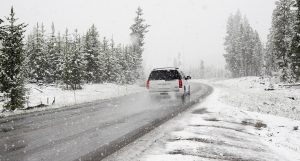
The Rocky Mountain States are not immune to winter weather and hazardous driving. In fact, snowfall in Wyoming usually occurs from October to May of each calendar year. Wyoming, Utah, and Idaho topography all include mountain ranges and high elevation, and in Jackson Hole, Wyoming, the average yearly snowfall is 109 inches, compared to 28 inches for the rest of the nation. Because of this almost constant winter weather, car accidents occur here on a frequent basis. This is partially due to poor driving conditions, but also because of negligent drivers. If you or a loved one suffered property damage or personal injury as a result of a defendant driver’s negligence, contact our legal team at Rocky Mountain Personal Injury Center.
Winter Weather Hazards
Ice, snow, freezing rain, sleet and black ice contribute to thousands of car and truck accidents a year. Drivers are reminded to use extreme caution when driving in hazardous weather conditions. Motorists should use their headlights, fog lights in a whiteout, windshield wipers, and maintain a safe distance from other vehicles. Drivers should maintain a safe speed at all times, but especially in poor driving conditions. In an ice or snow storm it is recommended to keep as much space as possible between your car and other vehicles on the roads. This is because it takes longer to apply brakes and come to a complete stop in winter weather due to loss of traction. Inability to stop in time or maneuver a vehicle properly is a major contributing factor to winter car accidents. Drivers also tend to drive at the same speeds or faster than they would in normal weather, also making it difficult to stop for hazards or avoid other vehicles on the road.
Next Steps After an Accident
After an accident, as long as it is safe to do so, obtain personal identifying information and insurance information from the other driver or drivers. Also obtain contact information from passengers and potential witnesses. Take photos of the intersection, precipitation if weather is a factor, and pictures of the damage to your vehicle and the other vehicle. Call the police and be sure to get a police report. In some situations, the responding officer might issue a citation to the at-fault driver at the scene of the accident. This criminal citation and the police report indicating the at-fault party can be used as evidence in your potential case. Seek emergency medical treatment if necessary, but at the very least see your primary care physician to rule out internal injuries, whiplash or a concussion.
After you have seen a doctor, call our attorneys at Rocky Mountain Personal Injury Center. We can assist you with filing a claim and preparing a statement for your insurance company. It is important that you report the accident so that a claim is filed; you can be compensated for property damage, sometimes up to the full value of your vehicle. You do not need to provide a statement to the other insurance company immediately after the accident and certainly not before you have consulted with an attorney. The goal of insurance subrogation is to settle claims as quickly and cheaply as possible. They do not have your best interests at heart and you do not need to feel pressured to settle for less than your claim is worth.
Schedule a Consultation Today
Traffic accidents are more than inconvenient. A serious car accident can result in severe physical injuries, permanent disability, lost wages, future lost wages, and emotional distress. If you or a loved one was injured in a car accident due to another’s driver negligence, you are entitled to damages and compensation for your injuries. Although severe weather can be a contributing factor to a collision, bad weather is not an excuse for poor driving or failure to maintain a safe distance. Do not wait to seek treatment or consult our attorneys for advice. Contact our legal team at Rocky Mountain Personal Injury Center today.




